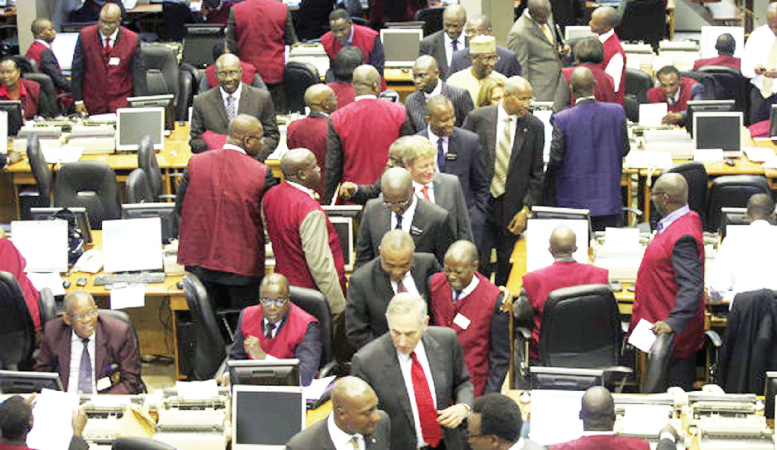- ICPC to Grill Suspended SEC DG on Monday
The suspended Director-General of the Securities Exchange Commission, Mr. Mounir Gwarzo, will on Monday appear before the Independent Corrupt Practices and Other Related Offences Commission as part of investigations into corruption allegations against him.
The Minister of Finance, Mrs. Kemi Adeosun, had on Wednesday suspended Gwarzo and two other officials of the commission for alleged involvement in corrupt practices.
Adeosun, who also set up an administrative panel of inquiry to probe the allegations, directed Gwarzo to hand over the affairs of the commission to the most senior director while he proceeded on suspension.
Following the suspension of Gwarzo, the ICPC, in a letter dated November 30, 2017, with reference number ICPC/INV/GBP/SG.2/852, invited the embattled DG to appear before it on Monday.
The letter, signed by the Head of Department, Investigations, ICPC, Adedayo Kayode, was addressed to the acting DG of SEC asking him to inform Gwarzo to appear on Monday.
The ICPC letter read in part, “The commission (ICPC) is investigating a case that borders on alleged violation of the provision of the Corrupt Practices and Other Related Offences Act, 2000.
“In view of the above and pursuant to Section 28 of the said Act, you are requested to inform Mr. Mounir Gwarzo to appear before the undersigned for the purpose of interview on Monday, 4th of December, 2017 at the commission’s headquarters, Abuja by 2pm prompt.”
Our correspondents also learnt that the DG on Thursday wrote members of staff of the commission to inform them of his suspension by the Finance minister.
The memo, a copy of which was made available to one of our correspondents, read, “Dear staff, this is to inform you that I have received a letter of suspension from the Minister of Finance.
“According to the letter dated, 29th of November, 2017, the suspension is to allow for a thorough investigation of the allegations levied against me.
“In the meantime, the management of the commission shall be under the leadership of Dr. Abdul Zubair in his capacity as the most senior officer of the Commission.
“The transfer of the mantle of leadership to Dr. Zubair is in compliance with the directive of the Minister of Finance.
“I urge every staff to give Dr. Zubair all the necessary support to ensure that the commission’s efficiency level is not in any way undermined.”
The suspended DG was accused of collecting N104,851,154.94 severance package while still in service.
He was also accused of being a director of Medusa Investment Limited in violation of Public Service Rules 030424 as well as awarding contracts to the same company and others to which he was related, thus resulting in a conflict of interest.
Some associates of the suspended DG, however, made available to one of our correspondents a memo written by Gwarzo to the Finance minister on November 28, 2017, in which he inferred that Adeosun had attempted to interfere with the forensic audit of Oando Plc.
According to him, the verbal directive by the minister that SEC should discontinue with the audit and hold a tripartite meeting with legal officers of the commission, Oando and the Federal Ministry of Finance with the purpose of coming up with penalties, which will be issued to top officials of the oil marketing firm in their personal capacities for payment, will put to question the independence and integrity of the commission.
Gwarzo stated in the memo, “It is important to stress that an action such as that proposed above will definitely put to question the independence and integrity of the commission, while also completely eroding the confidence of both local and international investors in the Nigerian capital market.
“Furthermore, as you may be aware, the activities around the investigation of Oando Plc are being closely monitored by the local and global investment community and they eagerly expect the outcome of the exercise. It is therefore not in the best interest of our recovering economy that the forensic audit is not seen to be conducted in an independent and transparent manner as proposed by the commission.”
However, the Special Adviser on Media to the minister, Oluyinka Akintunde, dismissed Gwarzo’s claims in the memo as being an afterthought and diversionary, adding that the suspended DG had conveniently avoided the issues that led to his suspension and that Adeosun had nothing to do with the Oando case.
He said Gwarzo should address the issues of receiving severance package while still in service and conflict of interest raised against him and allow the administrative panel of inquiry set up to investigate the allegations to conclude its work, adding that the same rules and process were followed in the case of a former Director-General of the National Pension Commission, who was first suspended, investigated and subsequently fired.
It was learnt on Thursday that the House of Representatives Committee on Capital Market had also commenced a separate probe into the matter.
The committee, led by Mr. Tajudeen Yusuf, is expected to sit next week.
Members of the House recommended tougher punishment for capital market operators who diverted funds from the system.
The Securities and Exchange Commission, for example, suggested a jail term of up to 15 years for such fraudsters.
SEC also recommended the payment of 500 per cent of the amount involved by anybody convicted of defrauding the market.
The recommendations were made at a public hearing organised by the House Committee on Capital Market Institutions on a bill to amend the Investment and Securities Act, 2017.


 Billionaire Watch3 weeks ago
Billionaire Watch3 weeks ago
 Startups4 weeks ago
Startups4 weeks ago
 News4 weeks ago
News4 weeks ago
 News4 weeks ago
News4 weeks ago
 Bitcoin4 weeks ago
Bitcoin4 weeks ago
 Naira4 weeks ago
Naira4 weeks ago
 Forex3 weeks ago
Forex3 weeks ago
 Treasury Bills4 weeks ago
Treasury Bills4 weeks ago
























